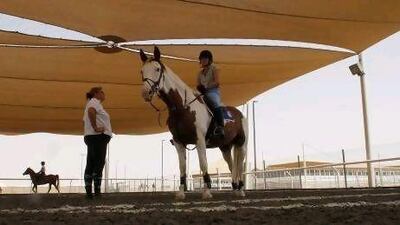DUBAI // It is not only people who suffer in the searing heat of summer while trying to keep fit and healthy.
Horses, that are trained throughout the year for some of the country's most prestigious competitions, must also stay in shape.
Unlike their Arabian counterparts, which are used for long-distance endurance racing, European horses are used for dressage and showjumping. They, like their human equivalents, are not accustomed to life in such heat.
Paul McAuley, manager of the Emirates Equestrian Centre that has 50 competition horses among the 152 at its stables, said he cannot give them the summer off as they are competing at such high levels, not only in the UAE but in Europe too.
"We exercise them but it's brought down to about two-thirds of their usual exercise," he says. "We take them out even earlier, around 5.30am or 6am, then after 5pm for about an hour."
Abdullah Al Marri, 28, a UAE showjumping champion who has been competing for more than 10 years in events such as the Dubai World Cup, is based at the centre. "The climate change is a really big issue as the horses are bred in Europe," he said.
These horses must be protected from the heat and as such are kept in air-conditioned stables.
"They work in either the early morning or sunset when there isn't so much heat," added Mr Al Marri.
To keep fit, they are either gently hand walked or use an automated walker, much like a treadmill but fitted with a fan to reduce the temperature, which they use through June and July.
"We take them out only a couple of times a week but they still need to move and the walker does the job very well," said Mr Al Marri.
"They don't need to be saddled and bridled. The amount of work they do during the rest of the year is so much more than the summer when they compete for two or three days a week per show three times a month with just one week off each month. There is a lot of fitness work."
Some of the more experienced horses travel to compete in Europe during the summer months, while the young ones stay behind to rest.
"As the weather gets hotter, in April and May, the competitions move indoors and most of our work outdoors is done after 6pm," said Mr Al Marri. "When it's extremely hot we avoid it."
During the summer, the horses are also taken to a special swimming pool where grooms can lead them along as they swim.
"They really like it in the summer," said Mr Al Marri. "It keeps their muscles moving and gets them fit for October. It keeps them healthy."
Christine Khairallah is the yard's manager and monitors the nutrition of the horses, which is of extra concern when things heat up. To keep them cool, they shave the horses' coats.
"We need to really make sure they do not dehydrate," she said. "We give them extra salts and electrolytes."
A dehydrated horse is easy to spot, she says, as its skin stays squashed when pinched and the animal becomes lethargic. "We have to stick to manual feeding to make sure we know how much they're drinking," she said, "or else they just don't drink enough."
Shirley Drayton's horse, Pippa, has been competing with her for 11 years. She brought her from the UK when she moved here three years ago. She said summers, in spite of the heat, are a vital time to keep horses moving while also allowing them some mental recovery from a hard season of competing.
"Summer is the time for me to do the things we don't get to do during the winter," she said. "Just letting Pippa walk where she wants in the paddock without an agenda. We slow things down as the weather heats up and I come up here earlier to beat the sun."
Ali Al Muhairi, a UAE champion endurance rider, said that during the summer it is vital for both competition horses and riders to ease off, with training rides that would be around 80km reduced to 6km or 12km.
"In the summer, the horses need to rest, so we stop, take breaks, let the horse drink and we wash them down with water and make the horse happy," said Mr Al Muhairi.
Like their showjumping counterparts, they too need the exercise of the pool or the walker, but are much more accustomed to the heat so only a small number have air-conditioned stables.
"Some like to be outside and just lay down," he said. "Others breathe very heavily so you have to just keep an eye on them."
For more in our Heatbeaters series, click here.

